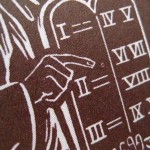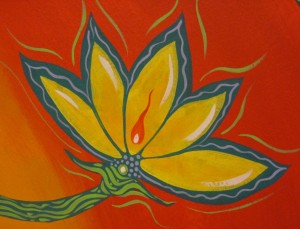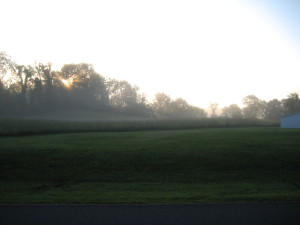
-Photo by Jan Ketchel
I dream that I’m walking along a country road. To the right is an old farm, sprawling along a flat expanse of land. There is a low white stucco farmhouse. The grass is very green, the landscape low rolling hills, a row of trees in the distance. As I look around and take in the landscape, I’m aware that this is an important dream. As I walk up to the farmhouse, I have an overall sense that I am going to learn something significant about myself.
Outside the front door, sitting inside a round pen, I find a small horse, the size of a Shetland pony. The horse is covered in mud, the ground it sits upon muddy too. It looks uncared for. I’m immediately worried about it, aware that it needs water.
I find a small white bowl and go into the house with the intention of getting some water for the horse. I walk into a long narrow room, somewhat like a throne room. Upon a dais sits an old great aunt, now dead, a person who had been pampered and taken care of her whole life. Adoring daughters, other relatives and family friends—all familiar to me—line the sides of the room and sit at her feet. I walk down the center of the room and up to her where she sits above everyone. I look up at her and tell her that the horse needs care, that I will come by every day to give it water and hay. I’ll take it for a walk. It needs exercise, I say. It will need a halter or leash, I say. I will also clean it, I say, because it needs to be brushed. Its back, I had noticed, was covered with clumps of mud.
After delivering my message, I turn and leave the room. When I am just outside the door I hear laughter, the people in the room giggling over my concern for the horse. It doesn’t bother me; I don’t take it personally because I know how important the horse is.
I go into a bathroom to pee and put water in the small white bowl, but when I flip the light switch there is no electricity. The bathroom is totally dark, with no windows. I find a flashlight on the counter and switch it on. It gives me enough light to see the toilet and the sink. I pee and then fill the bowl with water.
I go outside and give the bowl of water to the horse. I tell it that I’ll be back to walk it and take care of it every day. As I leave, I run into my brother, a builder. I tell him that the house needs some repairs, that the electricity in the bathroom isn’t working properly and that he should check it out. It isn’t really of concern to me, as only the welfare of the horse is of interest.
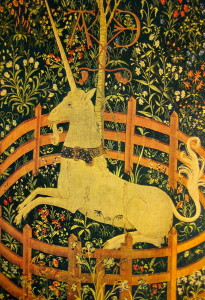
-Photo by Jan Ketchel
In the morning, as soon as I tell the dream to Chuck, I see the mandala: the horse sitting inside the round pen. Chuck, immediately thinking of the Medieval tapestry of the white unicorn sitting inside the round picket fence, asks me if the horse was white. I don’t think so, I say, it appeared to be brown in color, but it was covered in mud, so I don’t know for sure.
I decide that the appearance of my old great aunt, sitting above everyone, implies the ego, while the lack of light in the bathroom implies the conscious/unconscious. I’m aware that the horse is important, to me especially, but that’s as far as I get in my analysis. I let the dream sit for a while. Before long, however, greater meaning emerges, especially when I remember that Chuck and I had been reading about the Vedantic traditions of the kosas the night before. The kosas are the five sheaths that enclose the spiritual germ—the Atman—the spiritual energy that we all are. I begin to see the dream in the context of those sheaths, how everything in the dream was set up to lead me to the horse, what I see as the fourth sheath, the kosa of ancient wisdom. I did go back to an ancient place of family in the dream. The setting was not, however, my family’s estate as I had known it, but completely different, though in the dream I was aware that it was the family farm.
I begin to see that the dream had me encounter the first four sheaths or kosas: the physical, the breath, the ego/mental, and the ancient wisdom. The first kosa comes in the form of family members in their physical bodies, a lot of them overweight, but also ignorant as to why I cared so much about the horse. I am intent upon giving water to the horse. I see water perhaps representing the breath, the second sheath, the etheric pranamaya-kosa, which gives energy to the body. I then encounter the great aunt sitting upon her throne, representing the ego and the mental kosa, also represented by the dark bathroom which I light with the flashlight, the conscious and the unconscious. Finally, in the form of the horse, I encounter the wisdom sheath, vinjanamaya-kosa which I am intent on tending, bringing what it needs to live in health and harmony. Inside this last sheath lies bliss, anandamaya-kosa, the Atman. This is the ultimate goal of this life that I live, to experience my inner bliss, that eternal kernel of ethereal self.
I understand that the dream stresses all the things I’ve been doing for myself as I work on my physical body, as I do my inner work, my yoga and meditation, as I constantly realign and balance myself on my path. Lately, my personal process has evolved around bringing together all that I am, in harmony, in acceptance. I have been learning how to be the evolved person I had worked so hard to become during my recapitulation process, that assimilation also a process, as I always seek the next step that will take me into deeper and greater self-knowledge.
The dream stresses how to care for the ancient wisdom, how to exercise it and nurture it, while also allowing it to more fully live in my life every day. Just as I tell the horse that I will tend to it every day, so must I do the same in my daily life, tend to the wisdom of the ancients that I have learned about, that I channel and that I teach others about.
This is a very supportive dream, I conclude, in alignment with all that I am, with all the work that Chuck and I do, with what we talk about, write about, and are drawn to read about. It’s what we strive for. It’s about harmony, balance, and careful tending to all parts of the self. As Joseph Campbell says, we are constantly seeking to make ourselves transparent to the transcendent.
An hour later, something becomes clear and I reinterpret the dream slightly, but in quite an eye-opening way. I suddenly remember how important the little horse was to me in the dream, and that nothing was going to stop me from taking over its care. Now I see that the little horse actually represents the neglected fifth kosa—bliss. The dream itself, I realize, and the farmhouse setting represent the fourth kosa, ancient wisdom. I had a sense of this during the dream, as I walked toward the ancient farmhouse, aware that I was entering deeper into a dream of importance and significance.
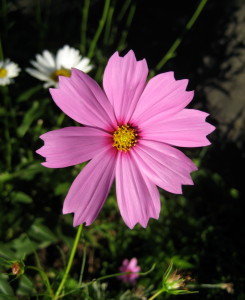
-Photo by Jan Ketchel
The dream actually leads me to where my bliss has been silently and patiently waiting for me, inside the sheath of the fence, which is actually rather flimsy and couldn’t really hold back the horse if it wanted to escape. I see this as the truth about our bliss, that it waits for us to find it. And once we become aware of it, it’s not that hard to access, nor is it really held back by anything other than our own inability to see it for what it is, and perhaps our inability to allow ourselves to have access to it, as we are taught that to seek our bliss is selfish. In reality, however, it’s all that matters. And so I name my little horse, Bliss.
Only by properly caring for and nurturing my bliss/Bliss will I be able to bring it to full health and life. And rather than having to search for it outside in the world, I now know that I have it inside me. It’s been there all along, always with me, at the center of my being. How could it be otherwise? Perhaps it’s a little white horse after all, the innocent unicorn that lies at the center of who we all are. In innocence lies the magical, the utterly transcendent. We just have to free it from it’s sheath, tear down its flimsy fence. Thank you, dreamworld!
I most humbly express my thanks for being able to tell you this dream. Perhaps it will help in your own dream interpretations. I know from experience that those sheaths have a habit of popping up quite often, in dreaming and in real life. They are the veils we talk about all the time, keeping us from our truths, and from our bliss. In the end, they fall quite easily, once we see what they are really made of.
Taking down the fences, and the sheaths, and the veils, and whatever else happens to get in the way of going deeper still,
Jan


